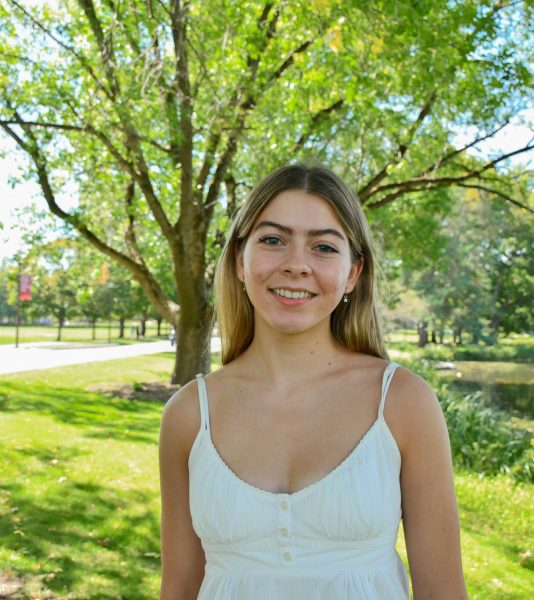Peggy Shumaker, the most recent author featured in Colgate University’s Living Writers series, is especially close to home for organizer of Living Writers and Professor of English Jennifer Brice — in fact, Brice studied under Shumaker while pursuing her MFA at the University of Alaska Fairbanks.
Shumaker has authored 11 books, including her most recent, “Cairn: New and Selected Poems,” which earned Shumaker a spotlight in the Living Writers curriculum.
Brice introduced her former teacher to attendees in Persson Auditorium.
“The poems combine moral clarity, complex ideas and emotions and simple, direct, heart-stoppingly beautiful language,” Brice said. “Peggy’s poems conjure the exterior physical landscapes, the flora and fauna of her best-loved places: Alaska, Arizona and Hawaii. Time and again, the poems remind us of how the natural world can seep into the skin, warming a person’s interior.”
Junior Maxwell Walker, a student in Brice’s Living Writers course, praised Shumaker’s distinct musicality.
“My favorite part about ‘Cairn’ was Shumaker’s unique voice. Her diction was, at times, breathtakingly visual, scientific and emotional, and together, the blend created a music unlike any other poet I’ve read,” Walker said.
Shumaker writes about her reverence for the natural world — its beauty, duality and durability. Shumaker peers on the sublime in her poetry; in doing so, her words become sublime, each line a revelation. Writing becomes religion. Death becomes life. Ghosts become gardens — like her late friend Eva Saulitus, who died of cancer in 2016.
“The Earth is what she becomes, and the Earth continues,” Shumaker said.
Shumaker’s collection is deeply touching and consistently profound. Yet, while she wrestles with serious topics — death, grief, growth, memory, nature — she is playful and even mischievous. Her words dance with life.
“I started writing as soon as I could pick up a pencil. My family was coming apart, and the page was the only place in the world that I had control. Writing was survival,” Shumaker said. “There’s a whole lot in this world that I don’t understand, and there’s a whole lot in this world that I can’t make better. Those are the two major reasons I write.”
And she’s pretty good at it, too. Sophomore August Haston, another student in Brice’s Living Writers course, applauded Shumaker’s skill.
“Shumaker, quite plainly, is a master of form. She understands page spacing in a way few poets do, and the blank spaces in her writing emphasized the thematic elements of grief and loss,” Haston said.
Shumaker writes about her loved ones with unparalleled tenderness. The reader forgets they have never met Eva, Eloise or Jack. Her affection and sensitivity threads her poems together, sketching portraits of the most important people in her life.
“Things that are deeply precise are often things we feel most intensely,” Shumaker said.
Besides her dear friends, Shumaker writes about her affinity for the natural world. Similar to Mary Oliver, Shumaker adopts the natural world as a lens through which she looks inside herself. The internal and external worlds merge into one in Shumaker’s poems.
“I’m highly susceptible to landscape,” Shumaker said. “I don’t claim to have scientific knowledge, but I have scientific curiosity.”
Shumaker was soft-spoken but brilliant in her reading of “Gnawed Bones” and “Valentine for Eva,” among others. Each word of her poetry has agency and sounds something like wisdom.
“I want poems in the world that enlarge the range of human perception, and I hope that my poems do that,” Shumaker said.
Her poems transport the reader to the gardens of Hawaii and the icy plains of Alaska with equal engrossment. Although she writes extensively about grief, Shumaker’s poems are distinctly alive.
“What we cannot yet reach / what we cannot yet do / the yet means we’re alive,” Shumaker writes in her poem, “Healing.” Shumaker has a new collection of poems, titled “Still Water Carving Light,” to be released in March 2025.
















